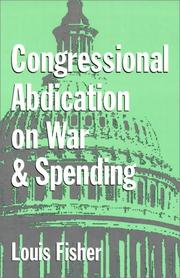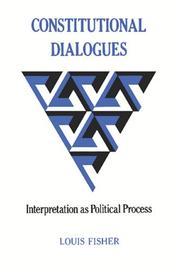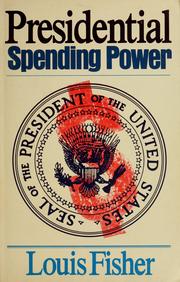| Listing 1 - 10 of 41 | << page >> |
Sort by
|

ISBN: 0700606912 0700606904 Year: 1995 Publisher: Lawrence Univ. press of Kansas
Abstract | Keywords | Export | Availability | Bookmark
 Loading...
Loading...Choose an application
- Reference Manager
- EndNote
- RefWorks (Direct export to RefWorks)
National security --- -War and emergency powers --- -Emergency powers --- War powers --- Constitutional law --- Delegation of powers --- Executive power --- Implied powers (Constitutional law) --- Legislative power --- War and emergency legislation --- War, Declaration of --- National security policy --- NSP (National security policy) --- Security policy, National --- Economic policy --- International relations --- Military policy --- Law and legislation --- -Government policy --- United States --- Foreign relations --- -Law and legislation. --- -Law and legislation --- -United States --- War and emergency powers --- Presidents --- Law and legislation.

ISBN: 0890969515 0890969507 9780890969502 9780890969519 Year: 2000 Volume: 7 Publisher: College Station Texas A and M university press
Abstract | Keywords | Export | Availability | Bookmark
 Loading...
Loading...Choose an application
- Reference Manager
- EndNote
- RefWorks (Direct export to RefWorks)
328.36 <73> --- Separation of powers --- -War and emergency powers --- -Executive power --- -328.36 <73> --- #SBIB:052.AANKOOP --- #SBIB:328H31 --- #SBIB:327.5H10 --- Emergency powers --- Power, Executive --- Presidents --- Political science --- Implied powers (Constitutional law) --- War powers --- Constitutional law --- Delegation of powers --- Executive power --- Legislative power --- War and emergency legislation --- War, Declaration of --- Checks and balances (Separation of powers) --- Division of powers --- Powers, Separation of --- Judicial independence --- Judicial power --- Judicial review --- Controle van parlement op de regering--Verenigde Staten van Amerika. VSA. USA --- Instellingen en beleid: VSA / USA --- Strategie: algemeen --- Powers --- Law and legislation --- United States. Congress --- -Powers and duties --- United States --- Appropriations and expenditures. --- 328.36 <73> Controle van parlement op de regering--Verenigde Staten van Amerika. VSA. USA --- War and emergency powers --- United States. --- Powers and duties --- Appropriations and expenditures --- Powers and duties. --- Separation of powers - United States --- War and emergency powers - United States --- Executive power - United States --- United States - Appropriations and expenditures

ISBN: 1400859573 069160519X 0691022879 9781400859573 9780691077802 0691077800 9780691022871 9780691605197 0691077800 9780691605197 Year: 1988 Publisher: Princeton, N.J. Princeton University Press
Abstract | Keywords | Export | Availability | Bookmark
 Loading...
Loading...Choose an application
- Reference Manager
- EndNote
- RefWorks (Direct export to RefWorks)
Who makes constitutional law? Is constitutional doctrine the monopoly of the courts? In accessible and persuasive prose Louis Fisher explains that constitutional law is not solely or even primarily the Supreme Court's "final word" but rather a richly political convergence of separate interpretations. With a broad range of examples, he argues that constitutional principles emerge from a dialogue among all three branches of government--executive, legislative, and judicial. Important contributions also come from the states and the general public. Fisher identifies executive and legislative initiatives in many areas of constitutional significance. Where there is litigation, the Court generally upholds these initiatives or may avoid making a constitutional decision by using "threshold devices." On those rare occasions when the Supreme Court exercises judicial review and strikes down a presidential or congressional action, it is usually only a matter of time before the proposal is revived and the dialogue begins again.Originally published in 1988.The Princeton Legacy Library uses the latest print-on-demand technology to again make available previously out-of-print books from the distinguished backlist of Princeton University Press. These editions preserve the original texts of these important books while presenting them in durable paperback and hardcover editions. The goal of the Princeton Legacy Library is to vastly increase access to the rich scholarly heritage found in the thousands of books published by Princeton University Press since its founding in 1905.
--Constitution --- --Constitutional law --- Droit constitutionnel --- --Interprétation --- --États-Unis --- Judicial review --- Constitutional law --- LAW / Constitutional. --- Public law. Constitutional law --- United States --- Interprétation --- Constitution --- Constitutional law - United States --- Judicial review - United States --- États-Unis --- United States of America

ISBN: 0691617694 0691644799 0691021732 1400868343 9781400868346 0691075751 9780691075754 9780691021737 1322883394 Year: 1975 Publisher: Princeton, N.J. Princeton University Press
Abstract | Keywords | Export | Availability | Bookmark
 Loading...
Loading...Choose an application
- Reference Manager
- EndNote
- RefWorks (Direct export to RefWorks)
Each year billions of dollars are diverted by the President and his assistants from the purposes for which Congress intended them. Billions more are used in confidential and covert ways, without the knowledge of Congress and the public. Here is the first account of how this money is actually spent.Louis Fisher writes: "When it comes to the administration of the budget, we find nothing that is obvious, very little that is visible. Our priorities here are peculiar. We fix upon the appropriations process, watching with great fascination as Congress goes about its business of making funds available to agencies. What happens after that point -the actual spending of money-rarely commands our attention."To unravel the mystery, Louis Fisher has investigated different forms of discretionary action: the transfer of funds that initially financed the Cambodian incursion; impoundment during the Nixon administration; covert financing; the reprogramming of funds; and unauthorized commitments. He describes each of these devices in operation and provides the historical background of Presidential spending power. In conclusion Louis Fisher presents a cogent and timely analysis of what can be done to improve Congressional control. Sufficient control, he maintains, cannot be achieved merely through the appropriations process, and he makes important recommendations designed to preserve discretionary authority while improving Congressional supervision.Originally published in 1975.The Princeton Legacy Library uses the latest print-on-demand technology to again make available previously out-of-print books from the distinguished backlist of Princeton University Press. These editions preserve the original texts of these important books while presenting them in durable paperback and hardcover editions. The goal of the Princeton Legacy Library is to vastly increase access to the rich scholarly heritage found in the thousands of books published by Princeton University Press since its founding in 1905.
Budget --- Finance, Public --- Specie payments --- United States --- Appropriations and expenditures. --- #SBIB:327.6H10 --- #SBIB:35H6030 --- Diplomatieke, consulaire en internationale openbare functies --- Bestuur en beleid: nationale en regionale studies: Verenigde Staten --- Political systems --- Public expenditure --- Planning (firm) --- Appropriations and expenditures --- Budget - United States --- Finance, Public - United States --- United States - Appropriations and expenditures --- United States of America
Book
ISBN: 9780700619313 0700619313 9780700619306 0700619305 Year: 2013 Publisher: Lawrence, Kansas : University Press of Kansas,
Abstract | Keywords | Export | Availability | Bookmark
 Loading...
Loading...Choose an application
- Reference Manager
- EndNote
- RefWorks (Direct export to RefWorks)
War and emergency powers --- National security --- Law and legislation --- aUnited States --- Foreign relations --- United States --- Law and legislation. --- War and emergency powers - United States --- National security - Law and legislation - United States --- aUnited States - Foreign relations - Law and legislation
Book
ISBN: 0199358397 Year: 2014 Publisher: New York : Oxford University Press,
Abstract | Keywords | Export | Availability | Bookmark
 Loading...
Loading...Choose an application
- Reference Manager
- EndNote
- RefWorks (Direct export to RefWorks)
This title places the law of the executive branch firmly in the context of constitutional language, framers' intent, and more than two centuries of practice. Each provision of the US Constitution is analyzed to reveal its contemporary meaning and in concert with the application of presidential power.
Presidents --- Executive power --- War and emergency powers --- Law - U.S. --- Law, Politics & Government --- Constitutional Law - U.S. --- Powers
Book
ISBN: 0312165307 9780312165307 Year: 1978 Publisher: New York (N.Y.): St. Martin's press,
Abstract | Keywords | Export | Availability | Bookmark
 Loading...
Loading...Choose an application
- Reference Manager
- EndNote
- RefWorks (Direct export to RefWorks)
Book
Year: 1973 Publisher: New York (N.Y.): Free press,
Abstract | Keywords | Export | Availability | Bookmark
 Loading...
Loading...Choose an application
- Reference Manager
- EndNote
- RefWorks (Direct export to RefWorks)
Separation of powers --- Executive power --- Legislative power
Book
ISBN: 9780199856213 0199856214 Year: 2014 Publisher: Oxford: Oxford university press,
Abstract | Keywords | Export | Availability | Bookmark
 Loading...
Loading...Choose an application
- Reference Manager
- EndNote
- RefWorks (Direct export to RefWorks)
Book
Year: 1973 Publisher: New York (N.Y.) : Free press,
Abstract | Keywords | Export | Availability | Bookmark
 Loading...
Loading...Choose an application
- Reference Manager
- EndNote
- RefWorks (Direct export to RefWorks)
| Listing 1 - 10 of 41 | << page >> |
Sort by
|

 Search
Search Feedback
Feedback About UniCat
About UniCat  Help
Help News
News